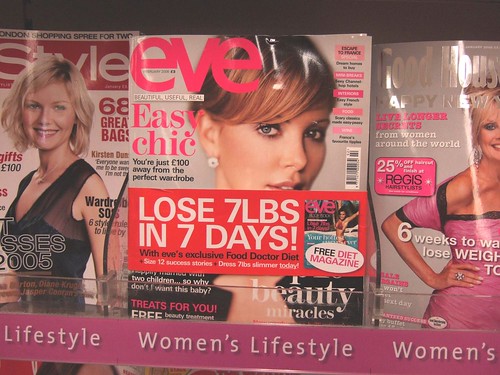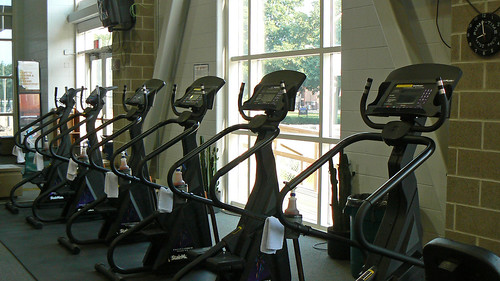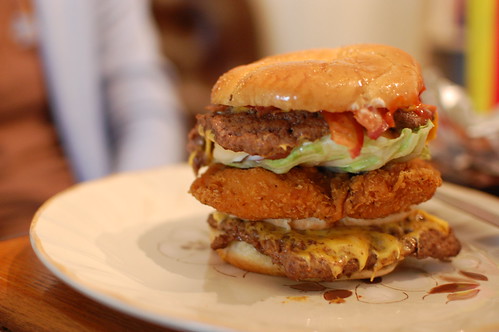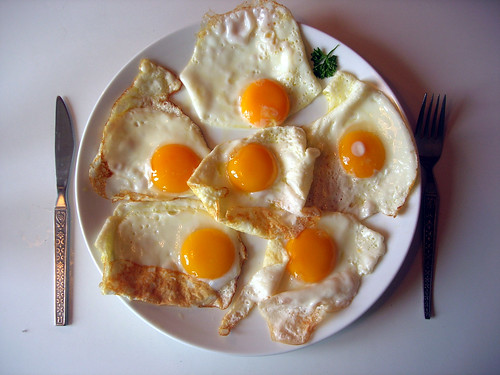Health Kick: The bad news
Before I start talking about what I did do, I think it’s worth mentioning some things I didn’t do because they don’t work. I’m also going to talk about some completely untrue things that I used to believe, and a few other unpleasant truths it’s important to understand.
This article is long, and probably pretty depressing. To make up for it, the next article will contain a bunch of good news. So, let’s get the bad news out of the way…
1. Diets don’t work.
You can’t go on a diet, get healthier, and then go back to what you were eating before and stay healthy. You’ll just put the weight back on again, and then diet again, and end up in a cycle of diets and weight gain like a daytime TV host. If you aren’t going to be able to stick to the new diet forever, it’s a waste of time.
Worse, many fad diets are unhealthy if you continue them long term. If you do something like Atkins, you actually need to adjust your behavior twice, because once you hit your target weight via Atkins you need to find a healthy regular diet and switch to that, permanently. The only way to be healthy long term, is if your everyday diet is healthy.
I’m strong-willed, but behavioral adjustment is hard. Permanent behavioral adjustment is particularly hard. Everyone can skip something tasty once, but what if you have to skip it forever? I figured I should work out a healthy long-term diet, focus all my efforts on switching to that, and wait however long it took for the weight to disappear.
So, for me at least, no Atkins/low-carb, South Beach, Gluten Free, or other ‘quick fix’ fad diet.
No paleo diet either. That’s a mixture of good advice and bullshit. Eating more raw and minimally processed foods is good, but the evidence for high meat diets being healthy, and for whole grains and beans being bad for you, is (at best) severely lacking.
2. Exercise doesn’t work.
Some people who find themselves overweight, figure that the solution is to hit the gym.
Nope.
You cannot possibly exercise enough to compensate for a bad diet. Dr Lustig talks about this in his first lecture. Sure, it’s relatively easy to burn 100 calories with 8 minutes on the elliptical, but 100 calories is just one of those tiny packs of miniaturized ‘healthy’ snacks, or two mini Milano cookies (not even full-size ones!)
That single slice of Cheesecake Factory carrot cake — which must be healthy, because it has carrots in, right? — is 1550 calories. You’re going to need to spend two whole hours on the elliptical to burn it, and that was just dessert.
So forget about exercising yourself to thinness. And you certainly won’t exercise your way to weighing less; muscle is heavier and denser than fat, so if you become a gym rat you’ll probably get heavier.
3. …But you need to exercise anyway.
Exercise is no substitute for improving your diet, but you still need to do it anyway, even if your diet is totally healthy. A sedentary lifestyle will kill you, no matter how good your diet.
Exercise does help keep your metabolism up, which helps your body to burn off calories, but only as long as your diet is healthy — that is, as long as they’re the right sort of calories. On which note…
4. Simply counting calories doesn’t work.
You can’t simply count calories and get fit. Dr Lustig talks about this myth in his lecture. It matters what you eat, not just how many calories there are in it. It matters enormously. The idea that losing weight is just a matter of calories in vs calories out is an oversimplification.
Need more convincing? Ponder this: If a healthy diet was simply a matter of ingesting the right number of calories, you could eat a Wendy’s Baconator Triple and drink a 2 liter bottle of Coke each day and be healthy and slim.
5. You can’t choose where to lose the fat.
You might be completely happy with your body, other than the muffin top. If so, tough luck — your body will decide where the fat gets burned first. It doesn’t matter which muscles you exercise; the body is really good at transporting energy around in the bloodstream. You cannot target where to lose the fat.
That said, men, your moobs will get smaller, which is awesome. The same effect works for women, but they may find it less awesome.
6. You might be fat and unhealthy and not even know it.
I didn’t look particularly fat. That’s because there are two different types of fat.
Subcutaneous fat is the fat just below the skin that makes up the spare tire, moobs, cottage cheese thighs, and so on. Back in the 80s I remember we were taught by Kelloggs that “if you can pinch more than an inch”, you might be overweight and should eat Special K for breakfast. However, the evidence these days is that subcutaneous fat is often harmless. It doesn’t always look great, but it isn’t going to kill you.
The fat that kills you is visceral fat, which gets deposited around your internal organs. Women are prone to accumulate subcutaneous fat, men are more prone to accumulate visceral fat. It’s visceral fat that is associated with cardiovascular disease, which probably explains why men have higher heart disease mortality rates.
If you are mostly viscerally fat, it’s known as TOFI: Thin Outside, Fat Inside.
7. If you get unfit enough, it might be really hard to fix.
Obviously, the further you are from good health, the harder it is to fix; that’s why I jumped on my (admittedly minor) situation immediately. The more kilos you are overweight, the more you have to lose, right? And since you can only safely lose weight at a rate of maybe 200g a day, the more you have to lose, the longer it’ll take.
But it’s worse than that. So much worse.
The body stores excess energy in your fat cells. The number of fat cells is fixed; they enlarge as energy is stored, and shrink again as energy is released. If you suck fat cells out via liposuction, your body just makes more to replace them; it knows how many you should have, and does its best to maintain that number. (So yeah, even liposuction doesn’t work. Bonus unpleasant truth for you.)
Unfortunately, if you get obese, your fat cells may stretch permanently in order to make enough space to store enough of the excess energy. This is known as having hypertrophic obesity. It’s also possible for the body to decide that it needs to make permanent space for more fat cells, in which case the result is hyperplastic obesity. Once the number of fat cells goes up, it doesn’t go down again — even if you have them sucked out.
Effectively, permanently stretching your fat cells or causing your body to grow new ones sets a new baseline level of stored fat that your body will then try to get you to to keep. That means the longer you are obese, and the more obese you get, the harder it is to ever get back to normal weight, and the harder it is to maintain normal weight.
This is why you’ll often see recommendations that people who’ve been obese need more regular exercise to keep the weight off.
8. Those eggs you’ve been avoiding are good for you.
If, like me, you’ve been avoiding eggs for years, the bad news is that you were doing nothing good for your health, and quite likely harming it.
It turns out that for most people, eating eggs doesn’t raise cholesterol levels in the blood. One (healthy) guy at LiveStrong decided to test the theory on himself. He ate 3 eggs every day for 3 months, far more than any medical authority would have recommended 10 years ago. At the end of that time, his bad cholesterol (LDL) levels were down, his fat levels were down, and his good cholesterol (HDL) levels were up.
Not only that, but even if you’re one of the 1 in 4 “cholesterol sensitive” people for whom dietary cholesterol does increase cholesterol levels, it probably doesn’t matter, because cholesterol doesn’t cause heart disease. It kinda looked like it did in the 1950s, when Ancel Keys published the Seven Countries Study; in fact, you could argue that Keys was the man who started the low-fat diet craze. But in Japan in the 80s, cholesterol went up while heart disease went down. Even in people over 70, high cholesterol is not associated with heart disease morbidity.
If you have kids, you can feed them eggs too.
Meanwhile, low cholesterol is linked to depression, because cholesterol is vital to serotonin receptors. And eggs from chickens which are fed a natural chicken diet contain Omega-3 fatty acids, which are also vital to physical and mental health.
9. Low fat foods aren’t helping
In fact, they’re actively counterproductive.
Since the 80s, we’ve all been taught that fat leads to heart disease and obesity. Stores are filled with products that are low in fat. I believed fat was the problem. I drank skim milk and ate low fat food.
Unfortunately, it’s now recognized that the low-fat diet is not healthy. That’s probably hard to believe, so here’s the Harvard School of Public Health:
It’s time to end the low-fat myth. For decades, a low-fat diet was touted as a way to lose weight and prevent or control heart disease and other chronic conditions, and food companies re-engineered products to be reduced-fat or fat-free […]
Why hasn’t cutting fat from the diet paid off as expected? Detailed research shows that the total amount of fat in the diet isn’t really linked with weight or disease.
Emphasis mine. Harvard School of Public Health again:
Dozens of studies, many from Harvard School of Public Health (HSPH) researchers, have shown that low-fat diets are no better for health than moderate- or high-fat diets—and for many people, may be worse.
Again, emphasis mine. Forget about foods engineered to be low in fat, they are bad for you. Really. It’s like that scene in Woody Allen’s Sleeper, except it’s true.
Why are low fat diets often worse? One big problem is that after you remove the fat, food doesn’t taste good, so the food scientists had to find something else. They generally chose sugar. And that brings me to the most unpleasant truth of all…
10. Sugar is poison
If you want all the scientific detail for this one, go watch the video by Dr Robert Lustig I mentioned in the intro to this series.
I use the word “poison” advisedly. As Dr Lustig explains, sugar — specifically fructose — is a poison in exactly the way alcoholic drinks are poison: It’s a delicious and enjoyable poison, which is the worst kind.
When I first moved to the US, I found that all the food tasted too sweet. That’s because in the US, there’s sugar in everything. Sugar in baked beans; sugar in bread; sugar in peanut butter. If you buy banana chips, they’re generally coated in sugar. Banana is, of course, a fruit, so that’s literally sugar-coated sugar!
As for eating too much, here are the stats from the American Heart Association:
A report from the 2001-04 NHANES (National Health and Nutrition Examination Survey) database showed that Americans get about 22.2 teaspoons of sugar a day or about 355 calories. This is well over the recommended amount of no more than 100 calories per day for women and no more than 150 calories per day for men.
Your maximum amount of added sugar per day, according to the AHA guidelines, is 25g for a woman (6 tsp), 37.5g for a man (9 tsp).
Ever had Pop-Tarts for breakfast? They come in packs of two. I bet you ate both, didn’t you? I know I used to. Two Kellogg’s Frosted Cherry Pop-Tarts — one foil pack — contain 34g of sugar. That’s your entire day’s sugar before you’ve even started lunch.
One single can of Coke has 35g of sugar too. I’ve seen “boutique” bottled sodas with 45g of sugar in, and of course they proudly proclaim that it’s all “natural cane sugar”, not HFCS, like that makes any difference when you’re ingesting almost twice your day’s safe limit in half an hour.
Ever go to Cinnabon, perhaps on your way through the airport, and enjoy a delicious cinnamon roll? 55g of sugar.
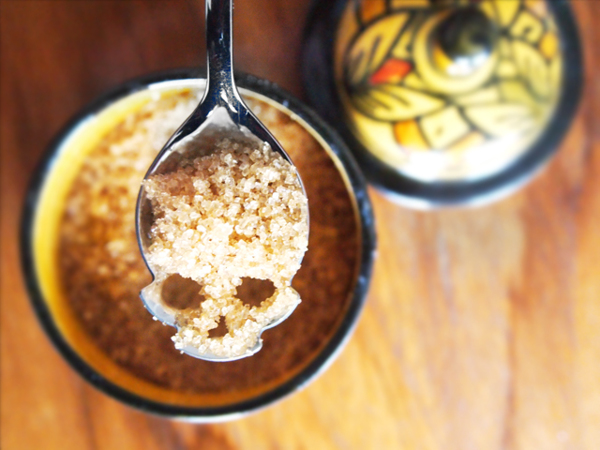
So, bad news aplenty. Next article, some good news.
